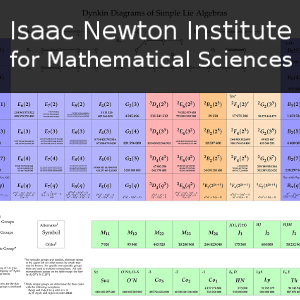Invariable generation of finite classical groups
19 mins 41 secs,
36.02 MB,
MP3
44100 Hz,
249.84 kbits/sec
Share this media item:
Embed this media item:
Embed this media item:
About this item

| Description: |
McKemmie, E
Thursday 30th January 2020 - 16:05 to 16:35 |
|---|
| Created: | 2020-01-30 16:57 |
|---|---|
| Collection: | Groups, representations and applications: new perspectives |
| Publisher: | Isaac Newton Institute |
| Copyright: | McKemmie, E |
| Language: | eng (English) |
| Distribution: |
World
|
| Explicit content: | No |
| Aspect Ratio: | 16:9 |
| Screencast: | No |
| Bumper: | UCS Default |
| Trailer: | UCS Default |
| Abstract: | We say a group is invariably generated by a subset if it forms a generating set even if an adversary is allowed to replace any elements with their conjugates. Eberhard, Ford and Green built upon the work of many others and showed that, as n→∞, the probability that Sn is invariably generated by a random set of elements is bounded away from zero if there are four random elements, but goes to zero if we pick three random elements. This result gives rise to a nice Monte Carlo algorithm for computing Galois groups of polynomials. We will extend this result for Sn to the finite classical groups using the correspondence between classes of maximal tori of classical groups and conjugacy classes of their Weyl groups. |
|---|---|
Available Formats
| Format | Quality | Bitrate | Size | |||
|---|---|---|---|---|---|---|
| MPEG-4 Video | 640x360 | 1.93 Mbits/sec | 285.61 MB | View | Download | |
| WebM | 640x360 | 409.52 kbits/sec | 59.04 MB | View | Download | |
| iPod Video | 480x270 | 521.98 kbits/sec | 75.19 MB | View | Download | |
| MP3 * | 44100 Hz | 249.84 kbits/sec | 36.02 MB | Listen | Download | |
| Auto | (Allows browser to choose a format it supports) | |||||

